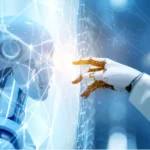Last year’s rise in popularity of AI tools, such as ChatGPT, paved the way for many possibilities across our global workforce. It’s now transforming the job market in an unprecedented way, with many professionals unable to keep up.
It changed how many businesses operate, adding new roles to adapt and help them navigate these advancements. It’s refreshing to know that many of these business owners take AI as a tool to use instead of an enemy you have to be afraid of.
Resisting this new technology can lead to many challenges, especially when seeking high-demand jobs in the next decade. While AI may replace some jobs, it will also create new ones. This could result in opportunities for those who are willing to adapt.
In this post, we will explore the impact of AI and automation is affecting the IT industry and your next steps in adapting to this disruptive shift.
How AI and Automation Changed the World
As with any controversial topic, there will always be individuals who support it and those who oppose it. Artificial intelligence is no exception. With the introduction of new AI tools and widespread news coverage, the divide between the two groups is likely to widen.
Market research analysts believe that AI has the potential to bring about numerous positive changes in society, like:
- Increased productivity
- Improved healthcare
- Enhanced access to education
However, we need to start adapting to these changes right away.
AI and robotics are expected to disrupt jobs, especially manual ones, but also create new opportunities, solve complex problems, and improve our lives. In IT, the impact is positive, particularly in handling big data. Combining AI with human expertise allows IT operations to be more agile and efficient, automating tasks and saving businesses time and money.
Navigating the Current Tech Job Market

As mentioned earlier, it’s generally accepted that AI will replace some tech-related roles. For instance, data entry and software testing roles could shift, as AI can automate the majority of the tasks these roles work on
While AI may automate some tasks, the tech job market is evolving rapidly. New roles in machine learning and data science are emerging as companies seek to develop, implement, and maintain AI systems. This shift is driving upskilling initiatives as companies invest in their workforce to stay competitive.
This highlights the challenge and opportunity for tech workers: the need to adapt their skillset to keep pace with the transformative power of AI, which has already impacted how companies recruit talent.
But how does it impact various roles? Do you have to upskill or change your field of expertise to adapt?
The Influence of AI on Tech Roles
Despite the headlines of big layoffs across the tech industry, IT remains the fastest-growing in terms of labor force and market share — with an estimated compound annual growth rate of up to 11%.
A notable driving force is AI. The demand for talent within this field is higher than ever due to its growing prevalence. Plus, it’s opening up job opportunities in industries beyond the traditional tech sector.
AI and Data Science

Data science is the field of study that involves extracting knowledge and insights from noisy data. It then turns into actions that a business or organization can take. It’s basically the intersection of three different disciplines:
- Computer science
- Mathematics
- Business expertise
Based on Diagonaux research, data science comes second for the most in-demand IT jobs. Early this year, SignalHire, which is a contact database used primarily by recruiters, decided to analyze the history of its internal searches made in fall 2023. By doing this, they discovered which IT vacancies were the most sought after by recruiters. According to the company insights, data scientists ranked second in all IT-related candidate searches, preceded only by software developers.
The same data also agrees with another research from Technopedia, which analyzed AI-related job openings rather than an entire IT sector in general. According to Technopedia, in the next few years, experts predict 40% and 35% job growth for artificial intelligence specialists and data scientists, respectively.
Despite AI automation in data science, human expertise remains vital. Data scientists with critical thinking and domain knowledge are irreplaceable for defining problems, analyzing data, interpreting results, and communicating insights. To stay relevant, explore tools like LIME or SHAP to understand complex AI models, and familiarize yourself with platforms like GCP or AWS for data storage and processing.
AI and Cybersecurity
Cybersecurity has been an in-demand industry for years now (from a job seeker POV). For starters, there is a shortage of professionals in the field. However, the projected job growth for information security analysts is expected to exceed 30%, according to Diagonaux.
We will likely continue to require human cybersecurity professionals for the foreseeable future. The emergence of AI technology could generate new employment opportunities. These jobs might involve overseeing AI systems or using advanced data analysis capabilities that AI tools can offer to inform decision-making.
Cyber security’s foundation extends beyond data analysis, and these core skills will remain crucial despite new technologies. Mastering tools like Palo Alto Networks Cortex XSOAR alongside CTI feeds and frameworks like MITRE ATT&CK will equip you to identify attacker tactics. Consider certifications like CISSP with a focus on security automation to further bolster your expertise.
AI and Marketing
Yes, tech jobs in sales are in an uptrend right now. With AI, the efficiency of analyzing customer data, including demographics, purchase history, and online behavior, has improved. Marketers are using this data to create better campaigns.
While understanding big data and AI-powered tools like CRMs and analytics software are valuable for marketing, the real edge comes from mastering AI for sales. Chatbots and virtual assistants can qualify leads and answer questions 24/7, but train them well to ensure a smooth experience. AI can also predict sales and opportunities, but your expertise is crucial to refine those predictions and prioritize effectively.
AI and Software Development
Devon (an AI tool for coding) is just a powerful aid for programmers, not a complete replacement. Tools like it are proof of concept, and current AI-generated code quality is not sufficient for complete automation.
Software development isn’t just coding! Problem-solving, teamwork, communication, and managing your time are all key. Keep learning and explore new trends (websites like Diagonaux can help).
Remember, tech is always changing, so being adaptable is key for a long, successful career. And even if AI takes over some coding, learning to program is a smart investment. It teaches valuable problem-solving skills and exposes you to core tech concepts that can benefit you in tech and beyond.
Bottom Line
AI is not a scary monster lurking under the bed. It can be a powerful tool for transformation. Jobseekers like you should upskill in relevant AI areas, showcase their adaptability, and network strategically.
On the other hand, business owners should embrace AI for efficiency, invest in upskilling their workforce, and focus on human-AI collaboration.
By understanding AI’s impact and taking proactive steps, all parties can thrive in this dynamic tech landscape. Remember, AI is here to augment human capabilities. Let’s embrace it and build a future-proof tech industry together.
If you want to learn more, visit our blog, diagonaux.com.

Hi there! I’m Admin and writer at Diagonaux.com, with over 30 years of experience. I love playing with words, whether it’s covering news, diving into business topics, or creating beautiful poems and stories. Making complex things easy to understand is my superpower. Join me on this writing journey, where I bring words to life in various exciting ways!




